International Relations: Europe's Twin Dangers, Putin's Expansionist Foreign Policy, and the Arab Spring
VerifiedAdded on 2023/06/01
|10
|2483
|216
AI Summary
This article delves into the intricacies of international relations in Europe, covering topics such as Putin's expansionist foreign policy, the Arab Spring, and the rise of the far-right. It includes insights from various authors and publications, highlighting the complexities and contradictions of the current political climate.
Contribute Materials
Your contribution can guide someone’s learning journey. Share your
documents today.
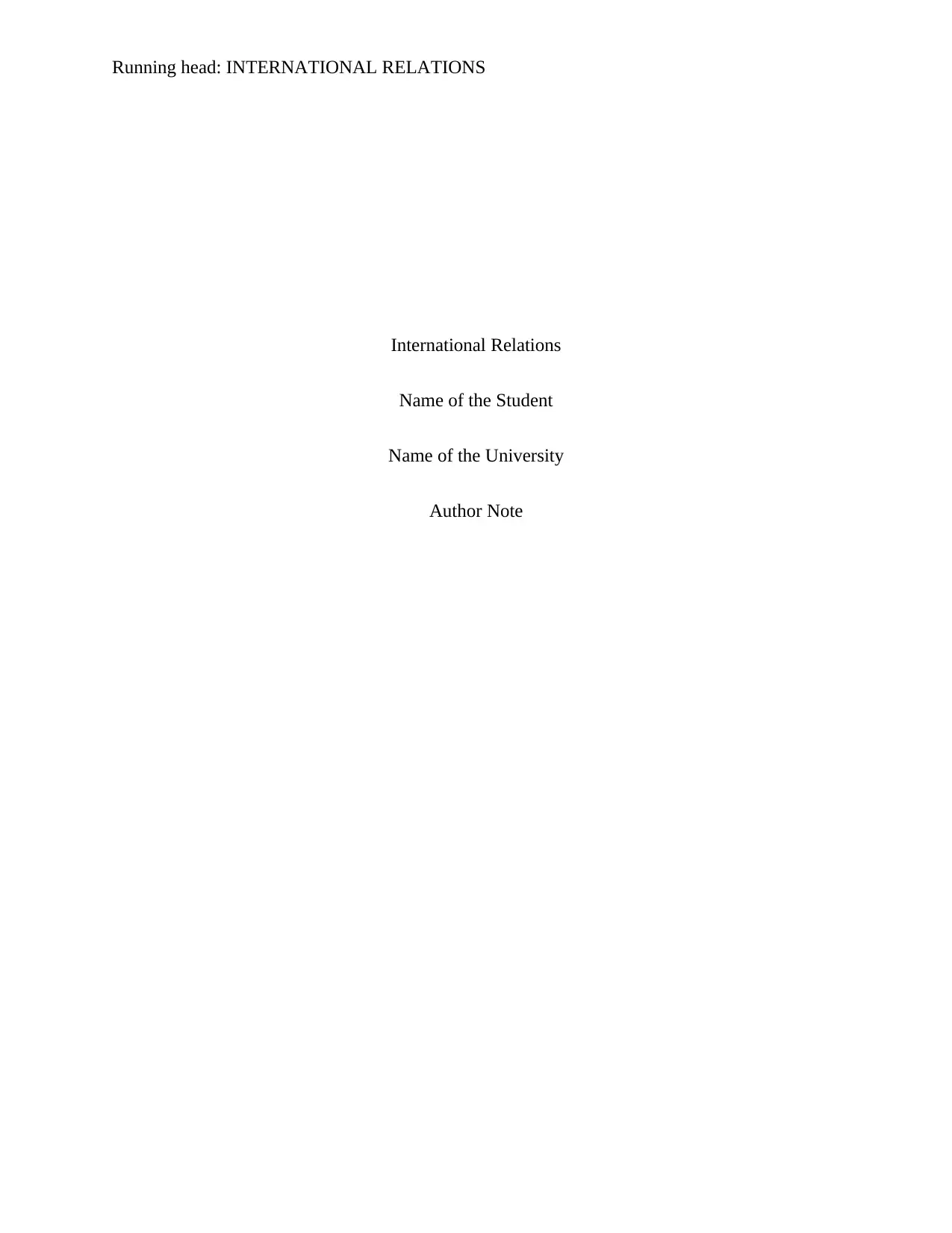
Running head: INTERNATIONAL RELATIONS
International Relations
Name of the Student
Name of the University
Author Note
International Relations
Name of the Student
Name of the University
Author Note
Secure Best Marks with AI Grader
Need help grading? Try our AI Grader for instant feedback on your assignments.
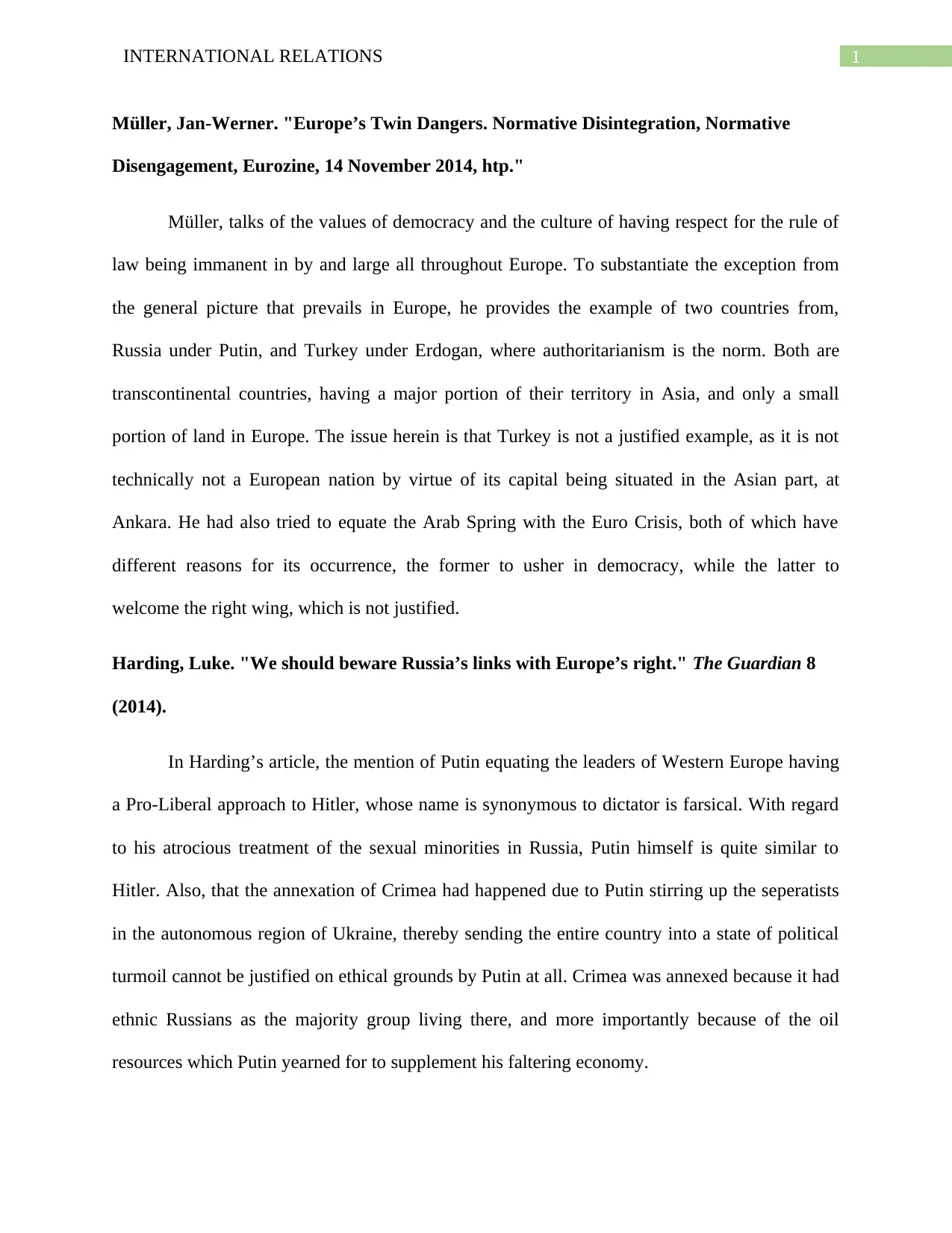
1INTERNATIONAL RELATIONS
Müller, Jan-Werner. "Europe’s Twin Dangers. Normative Disintegration, Normative
Disengagement, Eurozine, 14 November 2014, htp."
Müller, talks of the values of democracy and the culture of having respect for the rule of
law being immanent in by and large all throughout Europe. To substantiate the exception from
the general picture that prevails in Europe, he provides the example of two countries from,
Russia under Putin, and Turkey under Erdogan, where authoritarianism is the norm. Both are
transcontinental countries, having a major portion of their territory in Asia, and only a small
portion of land in Europe. The issue herein is that Turkey is not a justified example, as it is not
technically not a European nation by virtue of its capital being situated in the Asian part, at
Ankara. He had also tried to equate the Arab Spring with the Euro Crisis, both of which have
different reasons for its occurrence, the former to usher in democracy, while the latter to
welcome the right wing, which is not justified.
Harding, Luke. "We should beware Russia’s links with Europe’s right." The Guardian 8
(2014).
In Harding’s article, the mention of Putin equating the leaders of Western Europe having
a Pro-Liberal approach to Hitler, whose name is synonymous to dictator is farsical. With regard
to his atrocious treatment of the sexual minorities in Russia, Putin himself is quite similar to
Hitler. Also, that the annexation of Crimea had happened due to Putin stirring up the seperatists
in the autonomous region of Ukraine, thereby sending the entire country into a state of political
turmoil cannot be justified on ethical grounds by Putin at all. Crimea was annexed because it had
ethnic Russians as the majority group living there, and more importantly because of the oil
resources which Putin yearned for to supplement his faltering economy.
Müller, Jan-Werner. "Europe’s Twin Dangers. Normative Disintegration, Normative
Disengagement, Eurozine, 14 November 2014, htp."
Müller, talks of the values of democracy and the culture of having respect for the rule of
law being immanent in by and large all throughout Europe. To substantiate the exception from
the general picture that prevails in Europe, he provides the example of two countries from,
Russia under Putin, and Turkey under Erdogan, where authoritarianism is the norm. Both are
transcontinental countries, having a major portion of their territory in Asia, and only a small
portion of land in Europe. The issue herein is that Turkey is not a justified example, as it is not
technically not a European nation by virtue of its capital being situated in the Asian part, at
Ankara. He had also tried to equate the Arab Spring with the Euro Crisis, both of which have
different reasons for its occurrence, the former to usher in democracy, while the latter to
welcome the right wing, which is not justified.
Harding, Luke. "We should beware Russia’s links with Europe’s right." The Guardian 8
(2014).
In Harding’s article, the mention of Putin equating the leaders of Western Europe having
a Pro-Liberal approach to Hitler, whose name is synonymous to dictator is farsical. With regard
to his atrocious treatment of the sexual minorities in Russia, Putin himself is quite similar to
Hitler. Also, that the annexation of Crimea had happened due to Putin stirring up the seperatists
in the autonomous region of Ukraine, thereby sending the entire country into a state of political
turmoil cannot be justified on ethical grounds by Putin at all. Crimea was annexed because it had
ethnic Russians as the majority group living there, and more importantly because of the oil
resources which Putin yearned for to supplement his faltering economy.
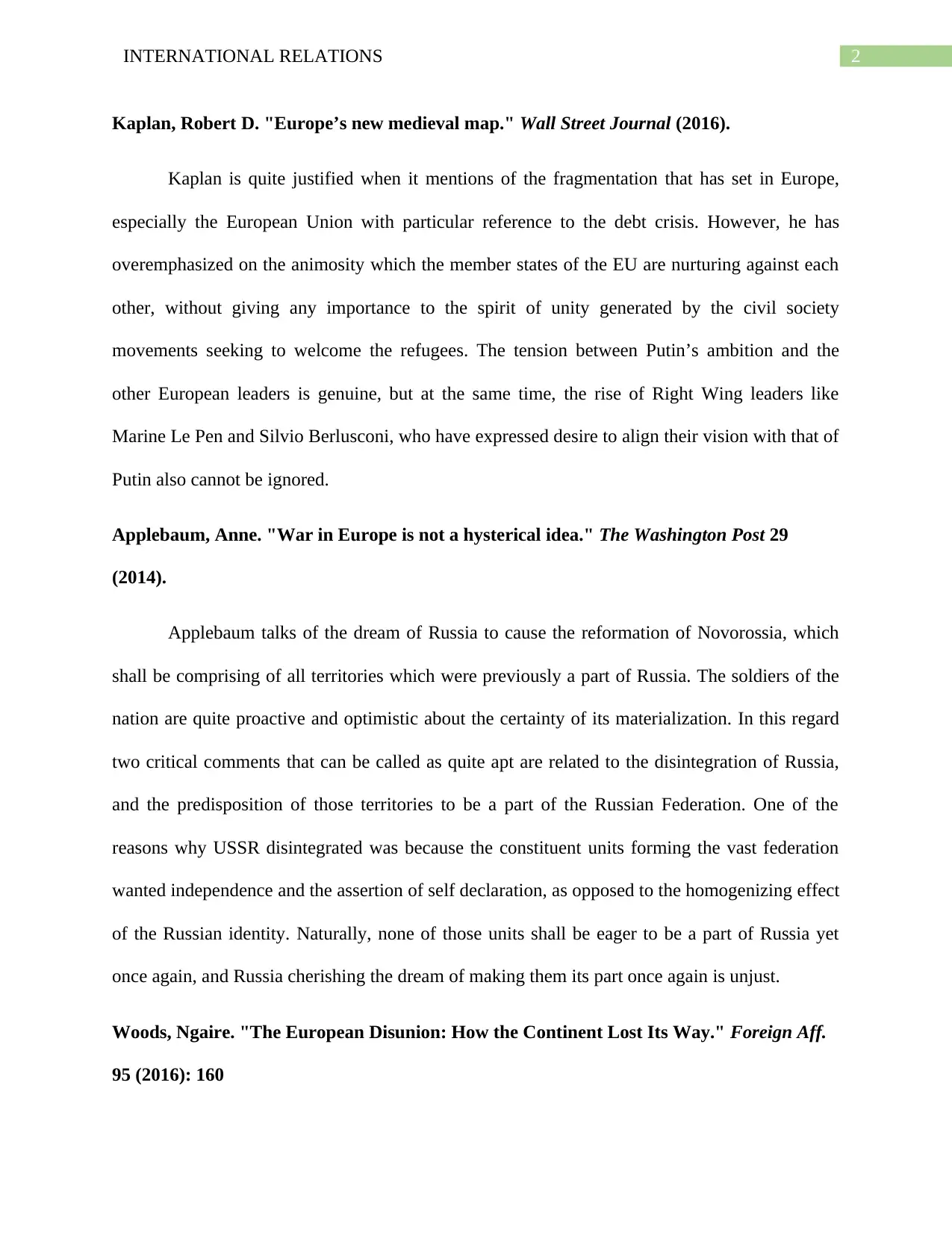
2INTERNATIONAL RELATIONS
Kaplan, Robert D. "Europe’s new medieval map." Wall Street Journal (2016).
Kaplan is quite justified when it mentions of the fragmentation that has set in Europe,
especially the European Union with particular reference to the debt crisis. However, he has
overemphasized on the animosity which the member states of the EU are nurturing against each
other, without giving any importance to the spirit of unity generated by the civil society
movements seeking to welcome the refugees. The tension between Putin’s ambition and the
other European leaders is genuine, but at the same time, the rise of Right Wing leaders like
Marine Le Pen and Silvio Berlusconi, who have expressed desire to align their vision with that of
Putin also cannot be ignored.
Applebaum, Anne. "War in Europe is not a hysterical idea." The Washington Post 29
(2014).
Applebaum talks of the dream of Russia to cause the reformation of Novorossia, which
shall be comprising of all territories which were previously a part of Russia. The soldiers of the
nation are quite proactive and optimistic about the certainty of its materialization. In this regard
two critical comments that can be called as quite apt are related to the disintegration of Russia,
and the predisposition of those territories to be a part of the Russian Federation. One of the
reasons why USSR disintegrated was because the constituent units forming the vast federation
wanted independence and the assertion of self declaration, as opposed to the homogenizing effect
of the Russian identity. Naturally, none of those units shall be eager to be a part of Russia yet
once again, and Russia cherishing the dream of making them its part once again is unjust.
Woods, Ngaire. "The European Disunion: How the Continent Lost Its Way." Foreign Aff.
95 (2016): 160
Kaplan, Robert D. "Europe’s new medieval map." Wall Street Journal (2016).
Kaplan is quite justified when it mentions of the fragmentation that has set in Europe,
especially the European Union with particular reference to the debt crisis. However, he has
overemphasized on the animosity which the member states of the EU are nurturing against each
other, without giving any importance to the spirit of unity generated by the civil society
movements seeking to welcome the refugees. The tension between Putin’s ambition and the
other European leaders is genuine, but at the same time, the rise of Right Wing leaders like
Marine Le Pen and Silvio Berlusconi, who have expressed desire to align their vision with that of
Putin also cannot be ignored.
Applebaum, Anne. "War in Europe is not a hysterical idea." The Washington Post 29
(2014).
Applebaum talks of the dream of Russia to cause the reformation of Novorossia, which
shall be comprising of all territories which were previously a part of Russia. The soldiers of the
nation are quite proactive and optimistic about the certainty of its materialization. In this regard
two critical comments that can be called as quite apt are related to the disintegration of Russia,
and the predisposition of those territories to be a part of the Russian Federation. One of the
reasons why USSR disintegrated was because the constituent units forming the vast federation
wanted independence and the assertion of self declaration, as opposed to the homogenizing effect
of the Russian identity. Naturally, none of those units shall be eager to be a part of Russia yet
once again, and Russia cherishing the dream of making them its part once again is unjust.
Woods, Ngaire. "The European Disunion: How the Continent Lost Its Way." Foreign Aff.
95 (2016): 160
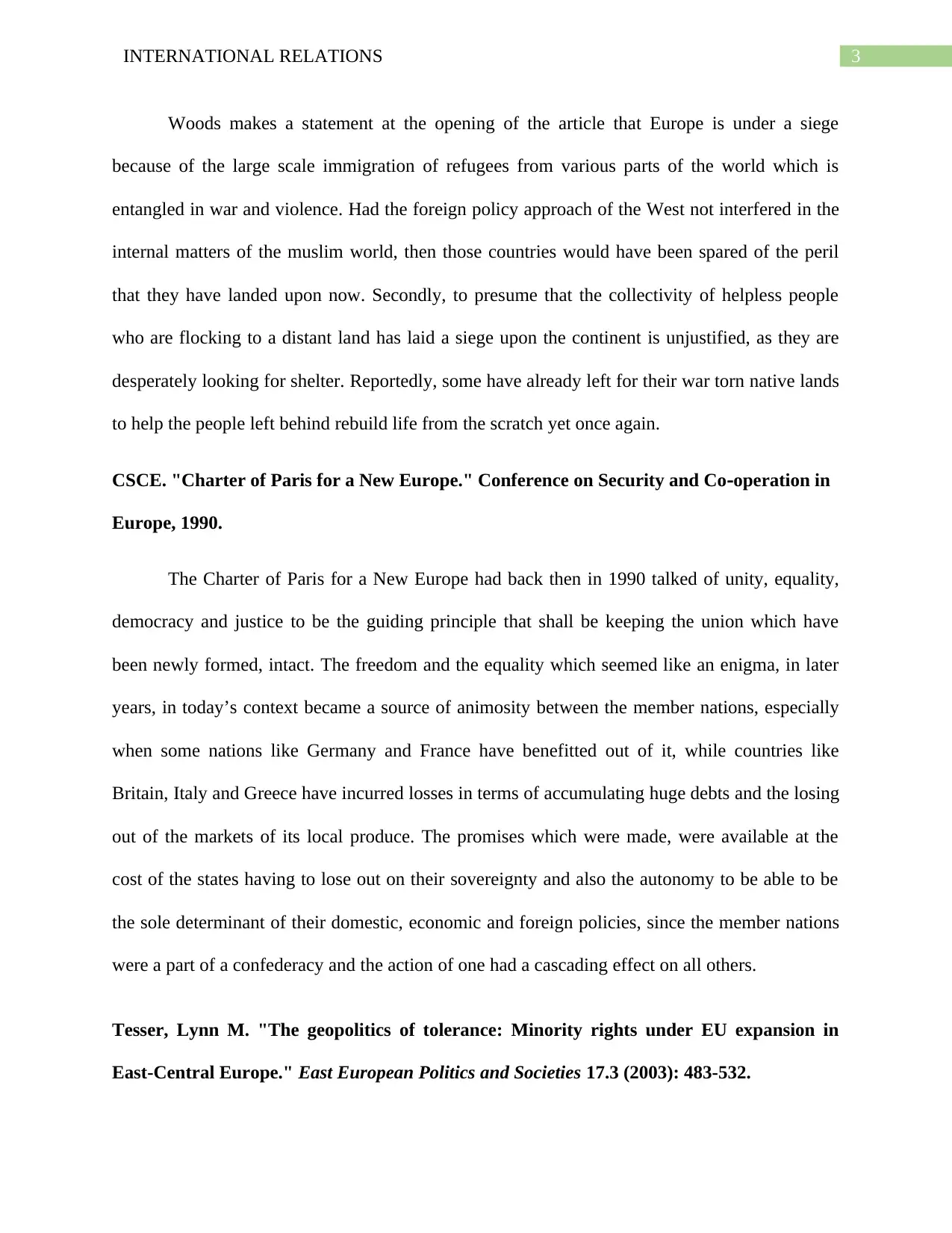
3INTERNATIONAL RELATIONS
Woods makes a statement at the opening of the article that Europe is under a siege
because of the large scale immigration of refugees from various parts of the world which is
entangled in war and violence. Had the foreign policy approach of the West not interfered in the
internal matters of the muslim world, then those countries would have been spared of the peril
that they have landed upon now. Secondly, to presume that the collectivity of helpless people
who are flocking to a distant land has laid a siege upon the continent is unjustified, as they are
desperately looking for shelter. Reportedly, some have already left for their war torn native lands
to help the people left behind rebuild life from the scratch yet once again.
CSCE. "Charter of Paris for a New Europe." Conference on Security and Co‐operation in
Europe, 1990.
The Charter of Paris for a New Europe had back then in 1990 talked of unity, equality,
democracy and justice to be the guiding principle that shall be keeping the union which have
been newly formed, intact. The freedom and the equality which seemed like an enigma, in later
years, in today’s context became a source of animosity between the member nations, especially
when some nations like Germany and France have benefitted out of it, while countries like
Britain, Italy and Greece have incurred losses in terms of accumulating huge debts and the losing
out of the markets of its local produce. The promises which were made, were available at the
cost of the states having to lose out on their sovereignty and also the autonomy to be able to be
the sole determinant of their domestic, economic and foreign policies, since the member nations
were a part of a confederacy and the action of one had a cascading effect on all others.
Tesser, Lynn M. "The geopolitics of tolerance: Minority rights under EU expansion in
East-Central Europe." East European Politics and Societies 17.3 (2003): 483-532.
Woods makes a statement at the opening of the article that Europe is under a siege
because of the large scale immigration of refugees from various parts of the world which is
entangled in war and violence. Had the foreign policy approach of the West not interfered in the
internal matters of the muslim world, then those countries would have been spared of the peril
that they have landed upon now. Secondly, to presume that the collectivity of helpless people
who are flocking to a distant land has laid a siege upon the continent is unjustified, as they are
desperately looking for shelter. Reportedly, some have already left for their war torn native lands
to help the people left behind rebuild life from the scratch yet once again.
CSCE. "Charter of Paris for a New Europe." Conference on Security and Co‐operation in
Europe, 1990.
The Charter of Paris for a New Europe had back then in 1990 talked of unity, equality,
democracy and justice to be the guiding principle that shall be keeping the union which have
been newly formed, intact. The freedom and the equality which seemed like an enigma, in later
years, in today’s context became a source of animosity between the member nations, especially
when some nations like Germany and France have benefitted out of it, while countries like
Britain, Italy and Greece have incurred losses in terms of accumulating huge debts and the losing
out of the markets of its local produce. The promises which were made, were available at the
cost of the states having to lose out on their sovereignty and also the autonomy to be able to be
the sole determinant of their domestic, economic and foreign policies, since the member nations
were a part of a confederacy and the action of one had a cascading effect on all others.
Tesser, Lynn M. "The geopolitics of tolerance: Minority rights under EU expansion in
East-Central Europe." East European Politics and Societies 17.3 (2003): 483-532.
Secure Best Marks with AI Grader
Need help grading? Try our AI Grader for instant feedback on your assignments.
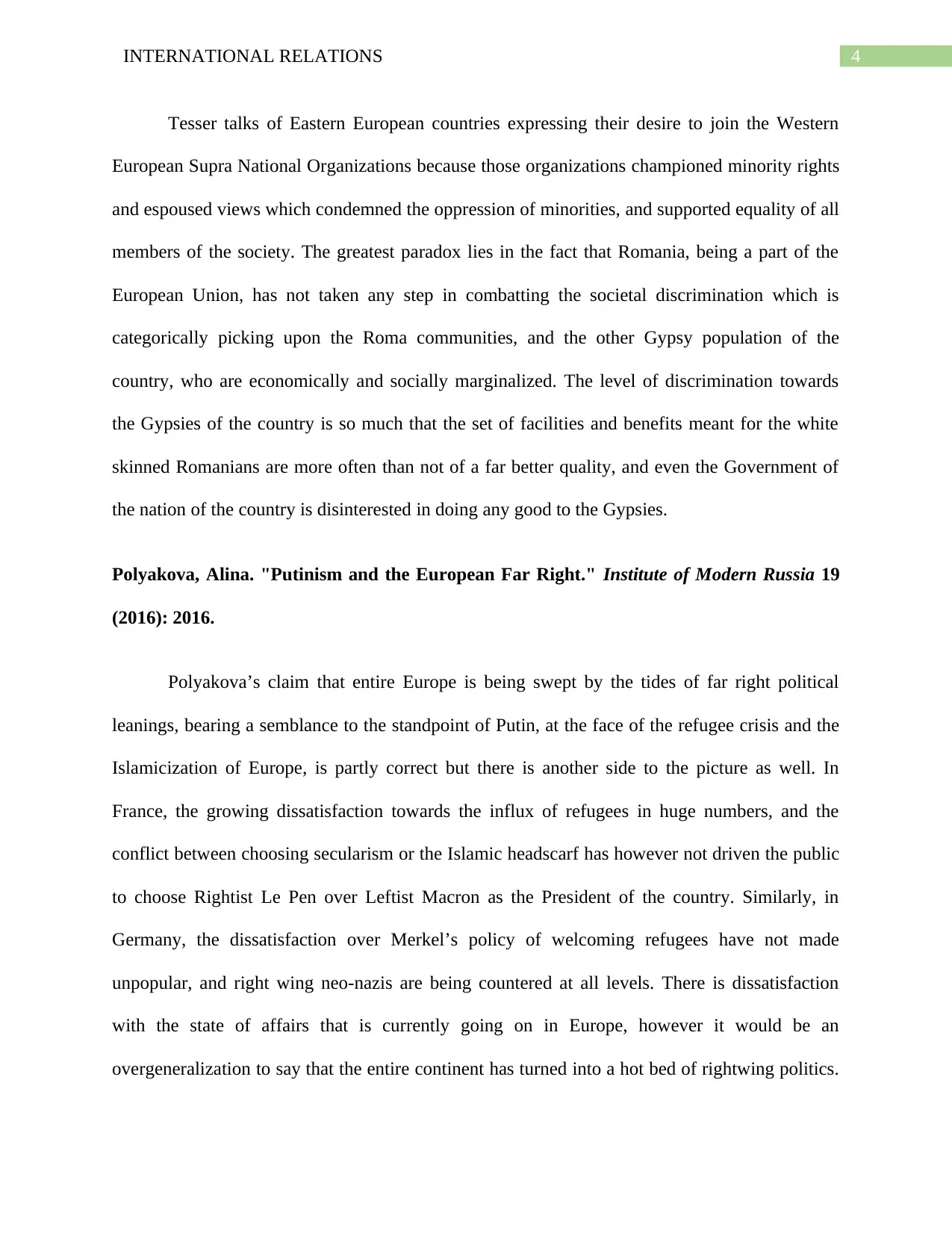
4INTERNATIONAL RELATIONS
Tesser talks of Eastern European countries expressing their desire to join the Western
European Supra National Organizations because those organizations championed minority rights
and espoused views which condemned the oppression of minorities, and supported equality of all
members of the society. The greatest paradox lies in the fact that Romania, being a part of the
European Union, has not taken any step in combatting the societal discrimination which is
categorically picking upon the Roma communities, and the other Gypsy population of the
country, who are economically and socially marginalized. The level of discrimination towards
the Gypsies of the country is so much that the set of facilities and benefits meant for the white
skinned Romanians are more often than not of a far better quality, and even the Government of
the nation of the country is disinterested in doing any good to the Gypsies.
Polyakova, Alina. "Putinism and the European Far Right." Institute of Modern Russia 19
(2016): 2016.
Polyakova’s claim that entire Europe is being swept by the tides of far right political
leanings, bearing a semblance to the standpoint of Putin, at the face of the refugee crisis and the
Islamicization of Europe, is partly correct but there is another side to the picture as well. In
France, the growing dissatisfaction towards the influx of refugees in huge numbers, and the
conflict between choosing secularism or the Islamic headscarf has however not driven the public
to choose Rightist Le Pen over Leftist Macron as the President of the country. Similarly, in
Germany, the dissatisfaction over Merkel’s policy of welcoming refugees have not made
unpopular, and right wing neo-nazis are being countered at all levels. There is dissatisfaction
with the state of affairs that is currently going on in Europe, however it would be an
overgeneralization to say that the entire continent has turned into a hot bed of rightwing politics.
Tesser talks of Eastern European countries expressing their desire to join the Western
European Supra National Organizations because those organizations championed minority rights
and espoused views which condemned the oppression of minorities, and supported equality of all
members of the society. The greatest paradox lies in the fact that Romania, being a part of the
European Union, has not taken any step in combatting the societal discrimination which is
categorically picking upon the Roma communities, and the other Gypsy population of the
country, who are economically and socially marginalized. The level of discrimination towards
the Gypsies of the country is so much that the set of facilities and benefits meant for the white
skinned Romanians are more often than not of a far better quality, and even the Government of
the nation of the country is disinterested in doing any good to the Gypsies.
Polyakova, Alina. "Putinism and the European Far Right." Institute of Modern Russia 19
(2016): 2016.
Polyakova’s claim that entire Europe is being swept by the tides of far right political
leanings, bearing a semblance to the standpoint of Putin, at the face of the refugee crisis and the
Islamicization of Europe, is partly correct but there is another side to the picture as well. In
France, the growing dissatisfaction towards the influx of refugees in huge numbers, and the
conflict between choosing secularism or the Islamic headscarf has however not driven the public
to choose Rightist Le Pen over Leftist Macron as the President of the country. Similarly, in
Germany, the dissatisfaction over Merkel’s policy of welcoming refugees have not made
unpopular, and right wing neo-nazis are being countered at all levels. There is dissatisfaction
with the state of affairs that is currently going on in Europe, however it would be an
overgeneralization to say that the entire continent has turned into a hot bed of rightwing politics.
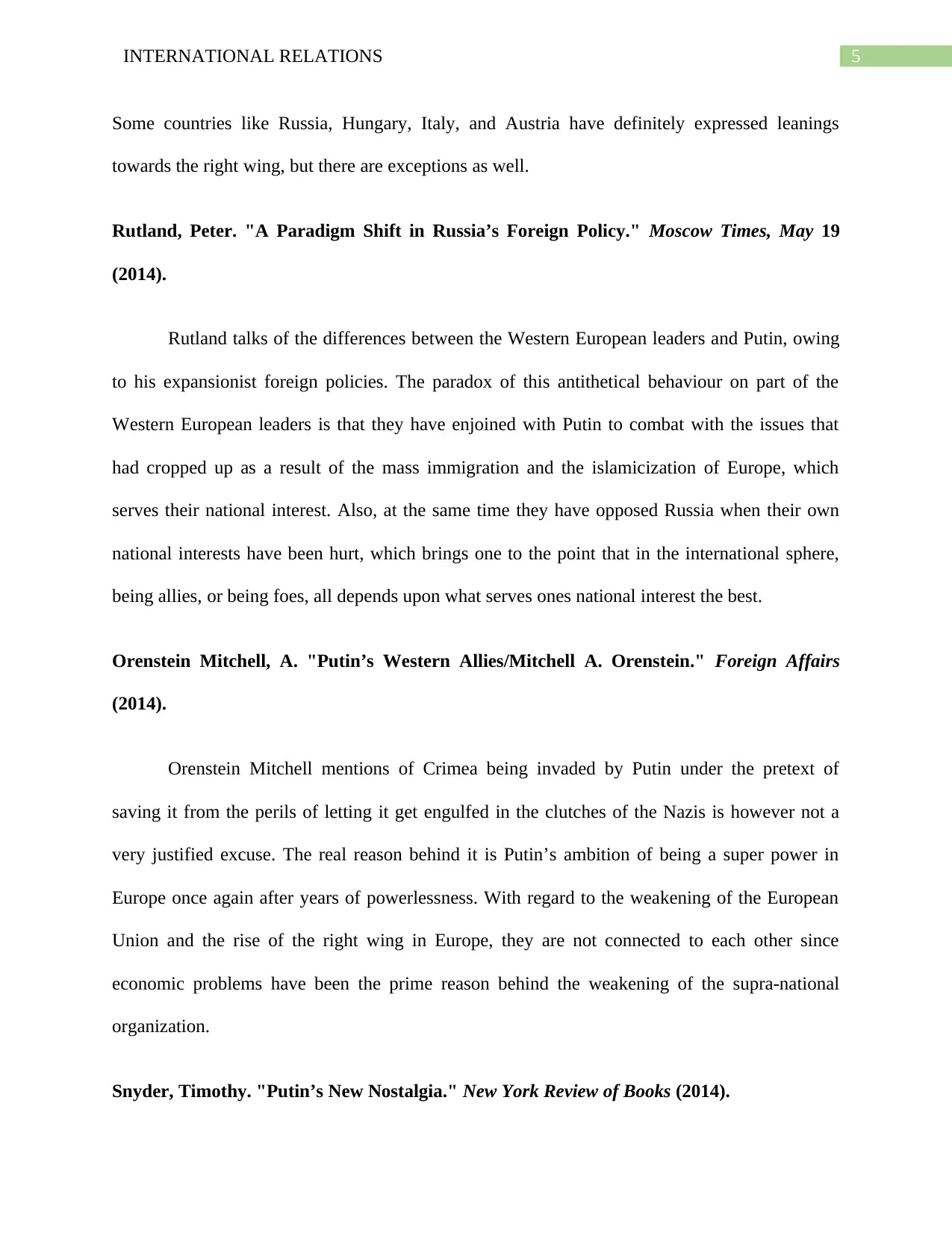
5INTERNATIONAL RELATIONS
Some countries like Russia, Hungary, Italy, and Austria have definitely expressed leanings
towards the right wing, but there are exceptions as well.
Rutland, Peter. "A Paradigm Shift in Russia’s Foreign Policy." Moscow Times, May 19
(2014).
Rutland talks of the differences between the Western European leaders and Putin, owing
to his expansionist foreign policies. The paradox of this antithetical behaviour on part of the
Western European leaders is that they have enjoined with Putin to combat with the issues that
had cropped up as a result of the mass immigration and the islamicization of Europe, which
serves their national interest. Also, at the same time they have opposed Russia when their own
national interests have been hurt, which brings one to the point that in the international sphere,
being allies, or being foes, all depends upon what serves ones national interest the best.
Orenstein Mitchell, A. "Putin’s Western Allies/Mitchell A. Orenstein." Foreign Affairs
(2014).
Orenstein Mitchell mentions of Crimea being invaded by Putin under the pretext of
saving it from the perils of letting it get engulfed in the clutches of the Nazis is however not a
very justified excuse. The real reason behind it is Putin’s ambition of being a super power in
Europe once again after years of powerlessness. With regard to the weakening of the European
Union and the rise of the right wing in Europe, they are not connected to each other since
economic problems have been the prime reason behind the weakening of the supra-national
organization.
Snyder, Timothy. "Putin’s New Nostalgia." New York Review of Books (2014).
Some countries like Russia, Hungary, Italy, and Austria have definitely expressed leanings
towards the right wing, but there are exceptions as well.
Rutland, Peter. "A Paradigm Shift in Russia’s Foreign Policy." Moscow Times, May 19
(2014).
Rutland talks of the differences between the Western European leaders and Putin, owing
to his expansionist foreign policies. The paradox of this antithetical behaviour on part of the
Western European leaders is that they have enjoined with Putin to combat with the issues that
had cropped up as a result of the mass immigration and the islamicization of Europe, which
serves their national interest. Also, at the same time they have opposed Russia when their own
national interests have been hurt, which brings one to the point that in the international sphere,
being allies, or being foes, all depends upon what serves ones national interest the best.
Orenstein Mitchell, A. "Putin’s Western Allies/Mitchell A. Orenstein." Foreign Affairs
(2014).
Orenstein Mitchell mentions of Crimea being invaded by Putin under the pretext of
saving it from the perils of letting it get engulfed in the clutches of the Nazis is however not a
very justified excuse. The real reason behind it is Putin’s ambition of being a super power in
Europe once again after years of powerlessness. With regard to the weakening of the European
Union and the rise of the right wing in Europe, they are not connected to each other since
economic problems have been the prime reason behind the weakening of the supra-national
organization.
Snyder, Timothy. "Putin’s New Nostalgia." New York Review of Books (2014).
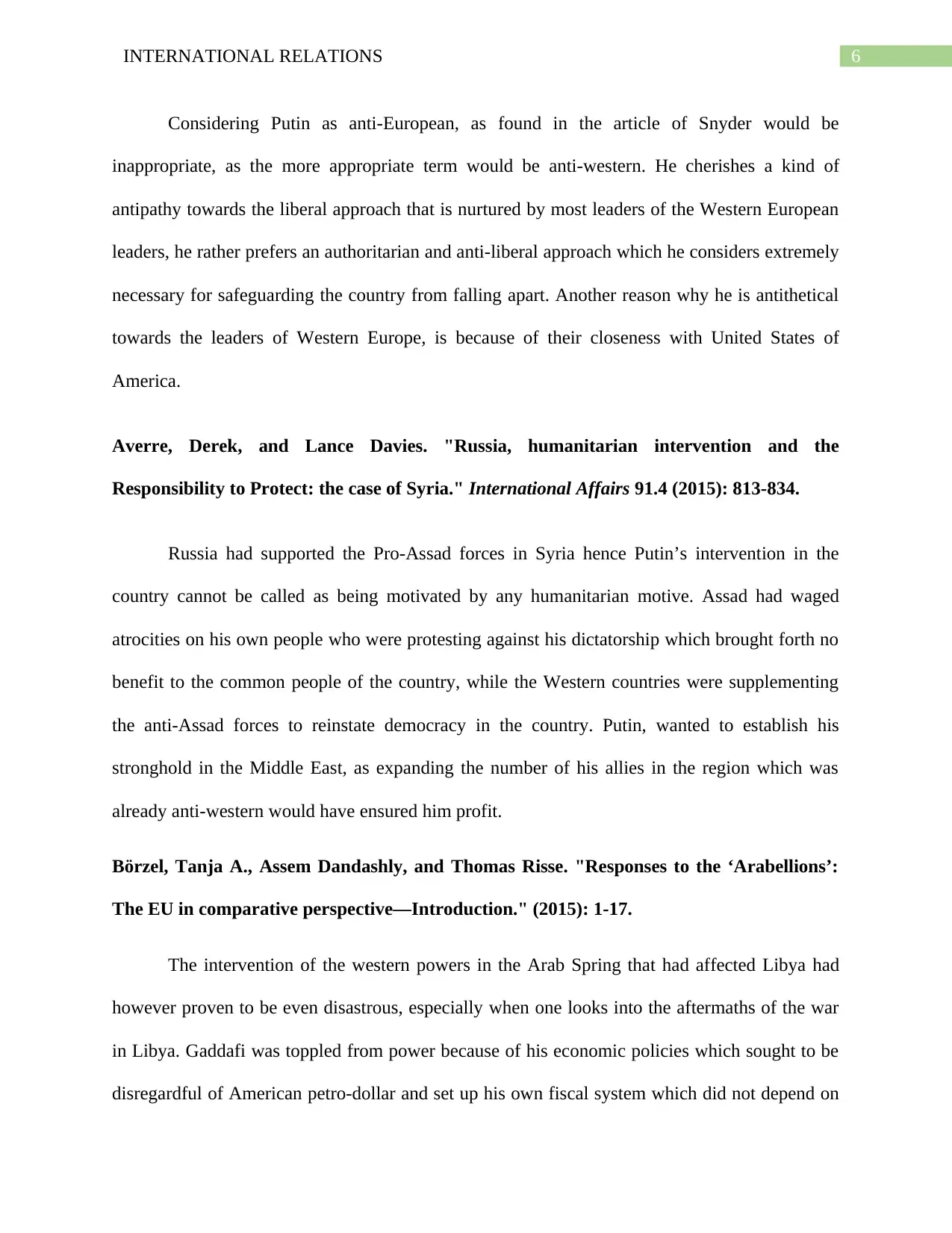
6INTERNATIONAL RELATIONS
Considering Putin as anti-European, as found in the article of Snyder would be
inappropriate, as the more appropriate term would be anti-western. He cherishes a kind of
antipathy towards the liberal approach that is nurtured by most leaders of the Western European
leaders, he rather prefers an authoritarian and anti-liberal approach which he considers extremely
necessary for safeguarding the country from falling apart. Another reason why he is antithetical
towards the leaders of Western Europe, is because of their closeness with United States of
America.
Averre, Derek, and Lance Davies. "Russia, humanitarian intervention and the
Responsibility to Protect: the case of Syria." International Affairs 91.4 (2015): 813-834.
Russia had supported the Pro-Assad forces in Syria hence Putin’s intervention in the
country cannot be called as being motivated by any humanitarian motive. Assad had waged
atrocities on his own people who were protesting against his dictatorship which brought forth no
benefit to the common people of the country, while the Western countries were supplementing
the anti-Assad forces to reinstate democracy in the country. Putin, wanted to establish his
stronghold in the Middle East, as expanding the number of his allies in the region which was
already anti-western would have ensured him profit.
Börzel, Tanja A., Assem Dandashly, and Thomas Risse. "Responses to the ‘Arabellions’:
The EU in comparative perspective—Introduction." (2015): 1-17.
The intervention of the western powers in the Arab Spring that had affected Libya had
however proven to be even disastrous, especially when one looks into the aftermaths of the war
in Libya. Gaddafi was toppled from power because of his economic policies which sought to be
disregardful of American petro-dollar and set up his own fiscal system which did not depend on
Considering Putin as anti-European, as found in the article of Snyder would be
inappropriate, as the more appropriate term would be anti-western. He cherishes a kind of
antipathy towards the liberal approach that is nurtured by most leaders of the Western European
leaders, he rather prefers an authoritarian and anti-liberal approach which he considers extremely
necessary for safeguarding the country from falling apart. Another reason why he is antithetical
towards the leaders of Western Europe, is because of their closeness with United States of
America.
Averre, Derek, and Lance Davies. "Russia, humanitarian intervention and the
Responsibility to Protect: the case of Syria." International Affairs 91.4 (2015): 813-834.
Russia had supported the Pro-Assad forces in Syria hence Putin’s intervention in the
country cannot be called as being motivated by any humanitarian motive. Assad had waged
atrocities on his own people who were protesting against his dictatorship which brought forth no
benefit to the common people of the country, while the Western countries were supplementing
the anti-Assad forces to reinstate democracy in the country. Putin, wanted to establish his
stronghold in the Middle East, as expanding the number of his allies in the region which was
already anti-western would have ensured him profit.
Börzel, Tanja A., Assem Dandashly, and Thomas Risse. "Responses to the ‘Arabellions’:
The EU in comparative perspective—Introduction." (2015): 1-17.
The intervention of the western powers in the Arab Spring that had affected Libya had
however proven to be even disastrous, especially when one looks into the aftermaths of the war
in Libya. Gaddafi was toppled from power because of his economic policies which sought to be
disregardful of American petro-dollar and set up his own fiscal system which did not depend on
Paraphrase This Document
Need a fresh take? Get an instant paraphrase of this document with our AI Paraphraser
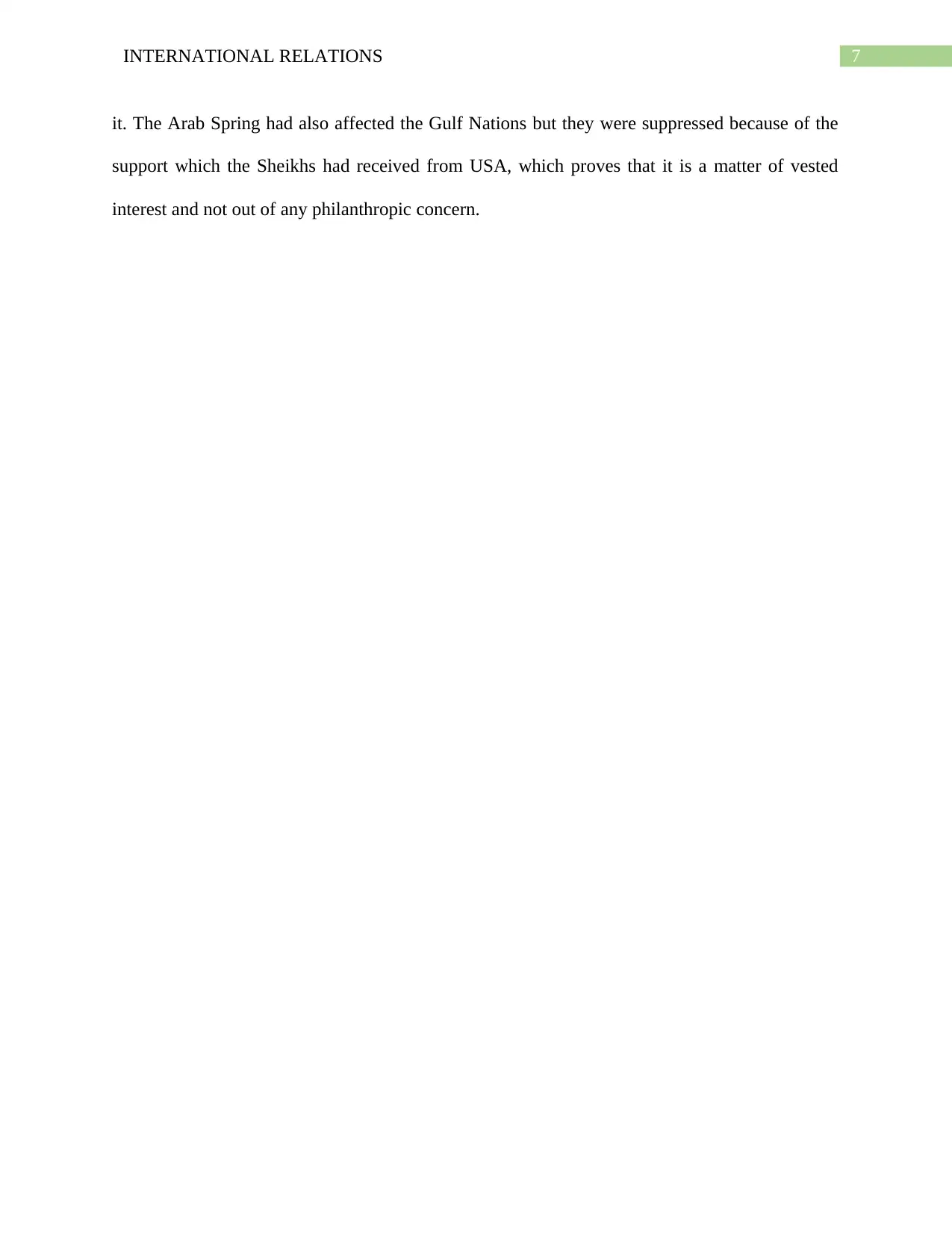
7INTERNATIONAL RELATIONS
it. The Arab Spring had also affected the Gulf Nations but they were suppressed because of the
support which the Sheikhs had received from USA, which proves that it is a matter of vested
interest and not out of any philanthropic concern.
it. The Arab Spring had also affected the Gulf Nations but they were suppressed because of the
support which the Sheikhs had received from USA, which proves that it is a matter of vested
interest and not out of any philanthropic concern.
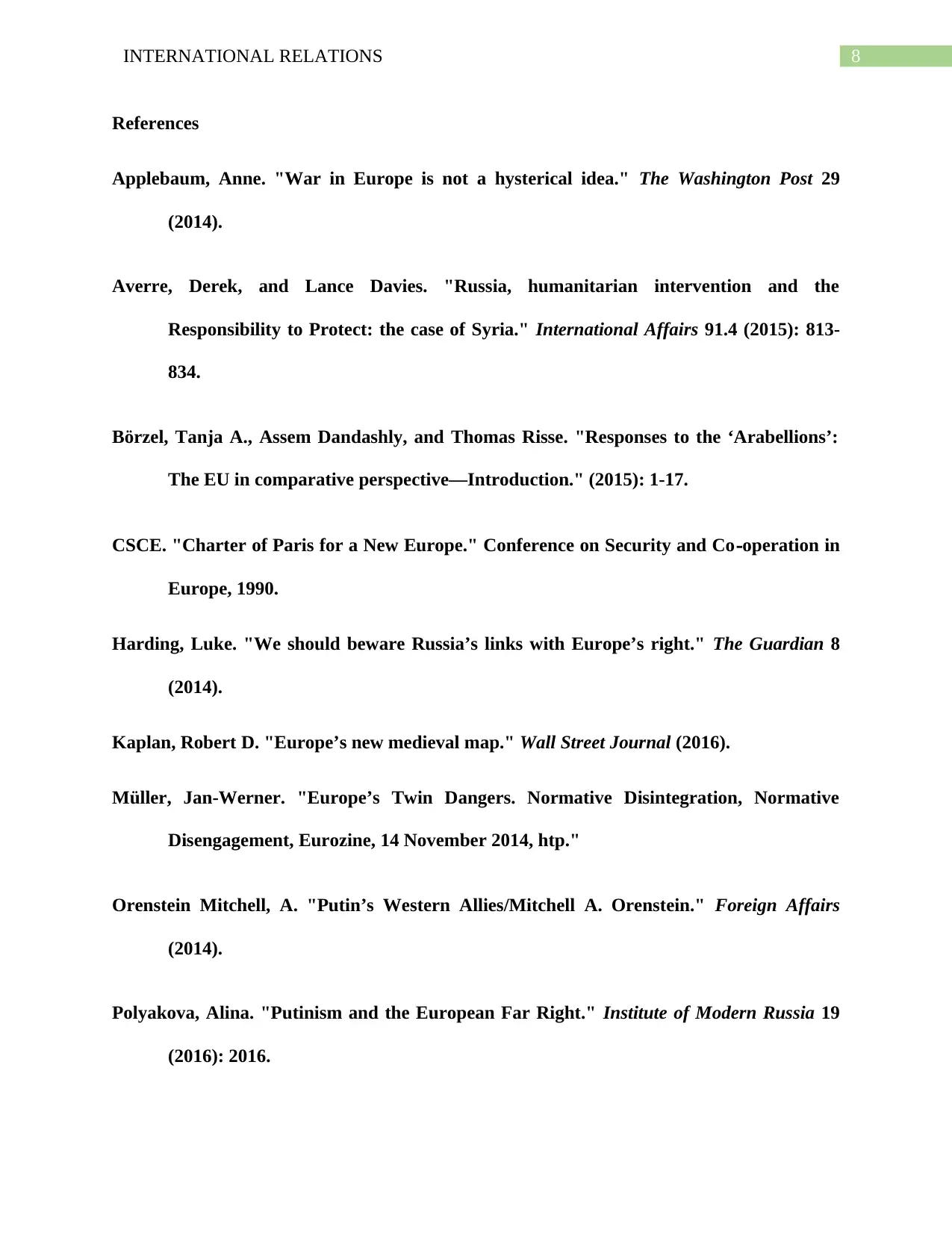
8INTERNATIONAL RELATIONS
References
Applebaum, Anne. "War in Europe is not a hysterical idea." The Washington Post 29
(2014).
Averre, Derek, and Lance Davies. "Russia, humanitarian intervention and the
Responsibility to Protect: the case of Syria." International Affairs 91.4 (2015): 813-
834.
Börzel, Tanja A., Assem Dandashly, and Thomas Risse. "Responses to the ‘Arabellions’:
The EU in comparative perspective—Introduction." (2015): 1-17.
CSCE. "Charter of Paris for a New Europe." Conference on Security and Co‐operation in
Europe, 1990.
Harding, Luke. "We should beware Russia’s links with Europe’s right." The Guardian 8
(2014).
Kaplan, Robert D. "Europe’s new medieval map." Wall Street Journal (2016).
Müller, Jan-Werner. "Europe’s Twin Dangers. Normative Disintegration, Normative
Disengagement, Eurozine, 14 November 2014, htp."
Orenstein Mitchell, A. "Putin’s Western Allies/Mitchell A. Orenstein." Foreign Affairs
(2014).
Polyakova, Alina. "Putinism and the European Far Right." Institute of Modern Russia 19
(2016): 2016.
References
Applebaum, Anne. "War in Europe is not a hysterical idea." The Washington Post 29
(2014).
Averre, Derek, and Lance Davies. "Russia, humanitarian intervention and the
Responsibility to Protect: the case of Syria." International Affairs 91.4 (2015): 813-
834.
Börzel, Tanja A., Assem Dandashly, and Thomas Risse. "Responses to the ‘Arabellions’:
The EU in comparative perspective—Introduction." (2015): 1-17.
CSCE. "Charter of Paris for a New Europe." Conference on Security and Co‐operation in
Europe, 1990.
Harding, Luke. "We should beware Russia’s links with Europe’s right." The Guardian 8
(2014).
Kaplan, Robert D. "Europe’s new medieval map." Wall Street Journal (2016).
Müller, Jan-Werner. "Europe’s Twin Dangers. Normative Disintegration, Normative
Disengagement, Eurozine, 14 November 2014, htp."
Orenstein Mitchell, A. "Putin’s Western Allies/Mitchell A. Orenstein." Foreign Affairs
(2014).
Polyakova, Alina. "Putinism and the European Far Right." Institute of Modern Russia 19
(2016): 2016.
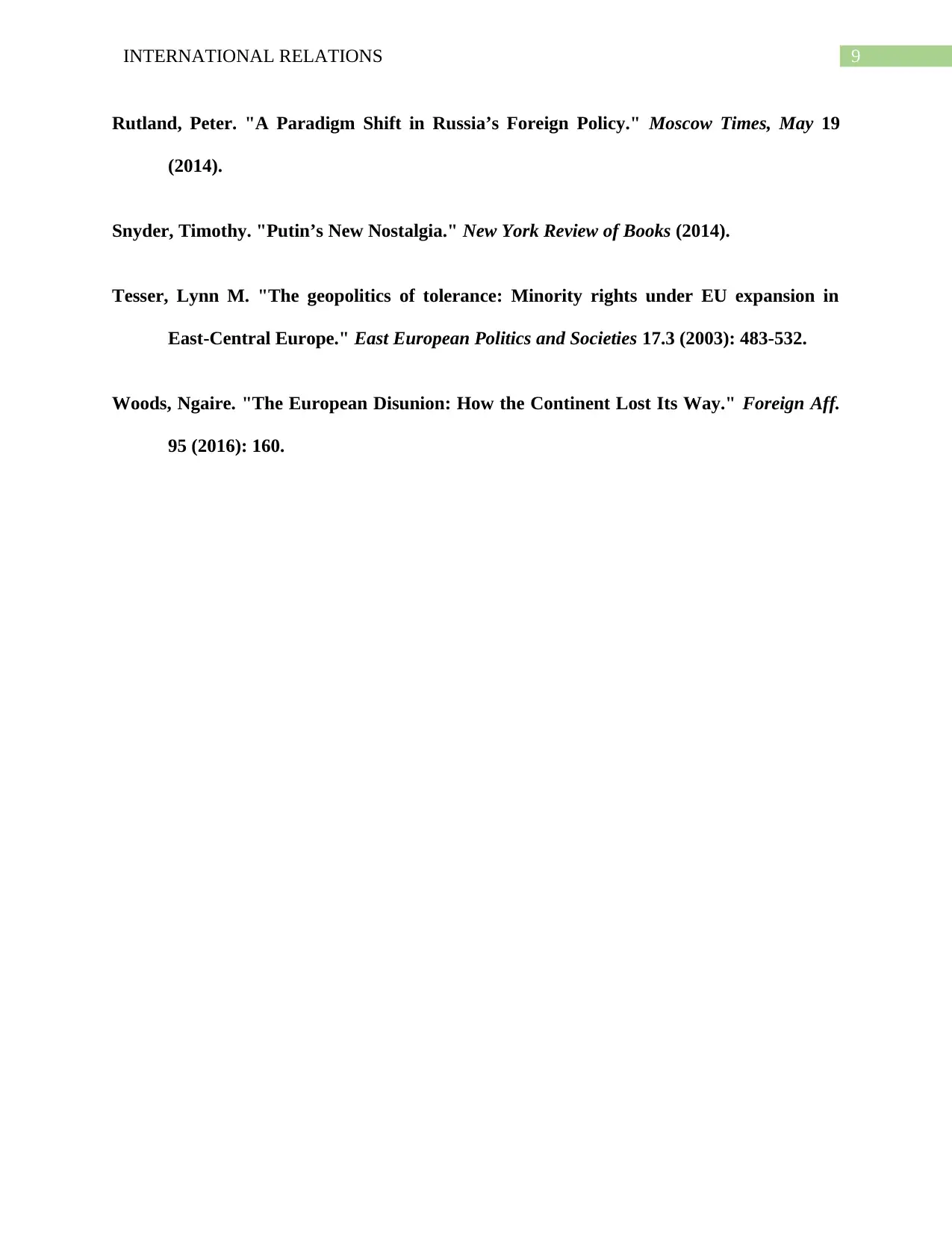
9INTERNATIONAL RELATIONS
Rutland, Peter. "A Paradigm Shift in Russia’s Foreign Policy." Moscow Times, May 19
(2014).
Snyder, Timothy. "Putin’s New Nostalgia." New York Review of Books (2014).
Tesser, Lynn M. "The geopolitics of tolerance: Minority rights under EU expansion in
East-Central Europe." East European Politics and Societies 17.3 (2003): 483-532.
Woods, Ngaire. "The European Disunion: How the Continent Lost Its Way." Foreign Aff.
95 (2016): 160.
Rutland, Peter. "A Paradigm Shift in Russia’s Foreign Policy." Moscow Times, May 19
(2014).
Snyder, Timothy. "Putin’s New Nostalgia." New York Review of Books (2014).
Tesser, Lynn M. "The geopolitics of tolerance: Minority rights under EU expansion in
East-Central Europe." East European Politics and Societies 17.3 (2003): 483-532.
Woods, Ngaire. "The European Disunion: How the Continent Lost Its Way." Foreign Aff.
95 (2016): 160.
1 out of 10
Your All-in-One AI-Powered Toolkit for Academic Success.
+13062052269
info@desklib.com
Available 24*7 on WhatsApp / Email
![[object Object]](/_next/static/media/star-bottom.7253800d.svg)
Unlock your academic potential
© 2024 | Zucol Services PVT LTD | All rights reserved.